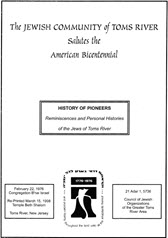THE OSKAR EHRMANN FAMILY
August 26 , 1937 was probably the one day in our lives that had more to do with shaping our future than any other. It was the day we arrived In Toms River.
We had landed in America on June 1st of that year after leaving Nazi Germany. Even though we lived for four years under the Nazi yoke and had felt the Nazi sting on many occasions, my parents' foresight had saved us much grief, perhaps our lives.
Our intention had always been to settle on a farm rather than to stay in a city. My father, who had been an independent business man in Germany wanted to be independent here also, and farming seemed the answer.
We felt no qualms about leaving the village of Nussloch, Germany, where our family's ancestry can be traced back at least 500 years. Even though the vast majority of the villagers were decent farm folk and many of them begged us not to leave ("This Nazi thing will blow over and then it will be like old times" was their appeal to us), we were determined to go. One German man, who now lives in Toms River and whose name I am not at liberty to mention, risked his own life by building valuables into old furniture for us, as well as for many other Jews, to be transported out of Germany. Our family reciprocated by bringing him and his family to Toms River after the War.
We were the first refugee family to settle in Toms River. Our first home was the old Eisen farm on Cedar Grove Road, which is now part of St. Joseph's Cemetery . Two years later we moved to the Maimone property on Old Freehold Road, which remained our permanent home.
Our experience on the farm was similar to that of so many other families. Work was so much more than we expected and income so much less (and no one had told us that chickens stop laying eggs and sometimes even die), but we were free and our little family, my Father, Oskar, my Mother, Friedel, my Brother, Ralph, and I, Hans, was intact.
Our first local contacts were the Eisens', the Belyers', the Estomins', the Jurists', from all of whom we bought chickens, and Mr. Chrednov, who transported them for us in his Model A pickup. A true friend and loyal advisor to us from the beginning to his untimely demise was Al Kushinsky. Our command of the English language was quite poor and it was a comfort to have someone we could trust and relate to in the handling of our legal matters. Ben Novins, Jerry Samuelson, Jack Baer, Max Horowitz and many others did much to help us feel secure and at home in our new environment.
In November 1937, my Uncle Ferdinand and his family, and my maternal Uncle Gus Mayer joined us, to be followed in June 1938 by my Aunt Mina and Grandmother Helene.
The following families from Germany joined us in Toms River thereafter: the families of Henry Richbeimer; Moritz Oppenheimer; Hugo Lowenthal; Theo Pfalzer; Ernst Guenzburger; Adolph Plaut; Julius Weil; Siegfried Mayer; Fred Rothschild; Heinrich Friedman; Max Heuman; Louie Reiss; Julius Maier; Hugo Grumbach; Bertha Guenzburger; Malchen Richheimer; Eric May; Max May; Emil Frankenberg; Gustav Grumbach; Luitpold Landman; Hugo Frankenberg; Kurt Rosenthal; Arthur Greenbaum; Henry Greenbaum; Alfred Bettauer; Isadore Rosenthal; Herman Rosenthal; William Sondheim; Theo Wertheimer; Harry Heit; Simon Rau; Berthold Strauss; Ludwig Goldsmidt; Max Kahn; Max Weil; Arnold Lehman; Sidney Wyman; Ludwig Kurzman; Gustav Wasserman; Paul Beitman; Herman Hiller and Gustav Lubin. If I have omitted anyone it was purely unintentional as I have relied solely an my own memory.
Like any beginning, it was not easy for these immigrant families to integrate into the local Jewish community . I remember Friday night, Shabbat, and High Holy Day services being held in the basement of the Richheimer residence on Old Freehold Road with Sifrei Torah salvaged from the Synagogue in Nussloch. Simon Rau, Moritz Oppenheimer, Adolph Plaut and others shared the "davening". The Sifrei Torah were later donated to the Toms River Jewish Community Center, Congregation B'nai Israel and Congregation Ahavat Shalom in Lakewood. The same basement also served often for gatherings and parties, but the shyness soon wore off and the new arrivals integrated with the earlier settlers. I also recall a big barbeque party on our farm given for the recent immigrants by Izzy Hirschblond , who like so many others did so much to make us feel at home.
For youngsters like my brother and I, the English language came so much easier than for our parents. We weren't in Toms River for more than two weeks when school started for us. Even though we had very little English background, after a few weeks in school we became quite "Americanized". Among my school mates were Mildred (Pyenson) Robinson; Irene Rosenberg; Philip Horowitz; Rebecca Breslau; Herman Jurist; Alton Estomin; Julius Haberman; Rubin Karol; Harry Weiss; Anna Kayer and Cora Oigenstein.
Our family, like so many others, had simchas and tragedies . In May, 1940 my youngest brother, Charles, was born. The first baby born to a refugee family (Dr. Sawyer called him "Columbus"), and just a few weeks later my Father passed away suddenly. This tragedy had a profound effect on our family. After the initial shock had subsided we took stock of our position, emotionally as well as financially. Our options were to flee to the city and try our luck there or to stick it out here on the farm. We decided on the latter course. Years of sacrifice and hard work lay ahead for all of us; but perseverance and togetherness , which only upbringing and love of family can bring, saw us through and brought us to our present position.
Hans Ehrmann
